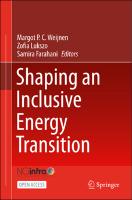Shaping an Inclusive Energy Transition
| dc.contributor.editor | Weijnen, Margot P. C. | |
| dc.contributor.editor | Lukszo, Zofia | |
| dc.contributor.editor | Farahani, Samira | |
| dc.date.accessioned | 2021-07-14T09:58:42Z | |
| dc.date.available | 2021-07-14T09:58:42Z | |
| dc.date.issued | 2021 | |
| dc.identifier | ONIX_20210714_9783030745868_21 | |
| dc.identifier | OCN: 1258672077 | |
| dc.identifier.uri | https://library.oapen.org/handle/20.500.12657/50042 | |
| dc.description.abstract | This open access book makes a case for a socially inclusive energy transition and illustrates how engineering and public policy professionals can contribute to shaping an inclusive energy transition, building on a socio-technical systems engineering approach. Accomplishing a net-zero greenhouse gas emissions economy in 2050 is a daunting challenge. This book explores the challenges of the energy transition from the perspectives of technological innovation, public policy, social values and ethics. It elaborates on two particular gaps in the design of public policy interventions focused on decarbonization of the energy system and discusses how both could be remedied. First, the siloed organization of public administration fails to account for the many interdependencies between the energy sector, the mobility system, digital infrastructure and the built environment. Cross-sector coordination of policies and policy instruments is needed to avoid potentially adverse effects upon society and the economy, which may hamper the energy transition rather than accelerate it. Second, energy and climate policies pay insufficient attention to the social values at stake in the energy transition. In addressing these gaps, this book intends to inspire decision makers engaged in the energy transition to embrace the transition as an opportunity to bring a more inclusive society into being. | |
| dc.language | English | |
| dc.subject.classification | thema EDItEUR::T Technology, Engineering, Agriculture, Industrial processes::TH Energy technology and engineering | en_US |
| dc.subject.classification | thema EDItEUR::T Technology, Engineering, Agriculture, Industrial processes::TB Technology: general issues::TBC Engineering: general | en_US |
| dc.subject.classification | thema EDItEUR::J Society and Social Sciences::JP Politics and government::JPP Public administration | en_US |
| dc.subject.classification | thema EDItEUR::R Earth Sciences, Geography, Environment, Planning::RN The environment::RND Environmental policy and protocols | en_US |
| dc.subject.other | Energy Systems | |
| dc.subject.other | Engineering Economics, Organization, Logistics, Marketing | |
| dc.subject.other | Public Policy | |
| dc.subject.other | Climate Change Management and Policy | |
| dc.subject.other | Energy Grids and Networks | |
| dc.subject.other | Industrial Management | |
| dc.subject.other | Earth System Sciences | |
| dc.subject.other | Energy Transition | |
| dc.subject.other | Smart Energy Systems | |
| dc.subject.other | Energy Poverty | |
| dc.subject.other | Social Inclusiveness | |
| dc.subject.other | Open Access | |
| dc.subject.other | Energy technology & engineering | |
| dc.subject.other | Engineering: general | |
| dc.subject.other | Management of specific areas | |
| dc.subject.other | Public administration | |
| dc.subject.other | The environment | |
| dc.title | Shaping an Inclusive Energy Transition | |
| dc.type | book | |
| oapen.identifier.doi | 10.1007/978-3-030-74586-8 | |
| oapen.relation.isPublishedBy | 6c6992af-b843-4f46-859c-f6e9998e40d5 | |
| oapen.relation.isFundedBy | 84985ffe-6741-4975-a417-4bac89b47dcb | |
| oapen.relation.isbn | 9783030745868 | |
| oapen.imprint | Springer International Publishing | |
| oapen.pages | 258 | |
| oapen.grant.number | [grantnumber unknown] |

